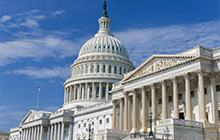 At the close of an extended term, on July 1, 2024, the U.S. Supreme Court expanded the time period for bringing a facial challenge to a federal agency rule. Before the decision in Corner Post, Inc. v. Board of Governors of the Federal Reserve System, the law in at least six appellate circuits, including the D.C. and Federal Circuits, was that a claim under the Administrative Procedure Act (APA) “first accrues” when the agency issues the challenged rule. No. 22-1008, 603 U.S. ___ (2024). Under Corner Post, however, accrual does not occur until the claimant is injured by the rule. Now, even if a final federal rule has stayed on the books for more than the six year limitations period, new facial challenges to the old rule can be timely maintained.
At the close of an extended term, on July 1, 2024, the U.S. Supreme Court expanded the time period for bringing a facial challenge to a federal agency rule. Before the decision in Corner Post, Inc. v. Board of Governors of the Federal Reserve System, the law in at least six appellate circuits, including the D.C. and Federal Circuits, was that a claim under the Administrative Procedure Act (APA) “first accrues” when the agency issues the challenged rule. No. 22-1008, 603 U.S. ___ (2024). Under Corner Post, however, accrual does not occur until the claimant is injured by the rule. Now, even if a final federal rule has stayed on the books for more than the six year limitations period, new facial challenges to the old rule can be timely maintained.
Corner Post, a truck stop and convenience store incorporated in North Dakota in 2018, challenged a 2011 Federal Reserve rule setting debit card swipe fee maximums ($0.21 plus .05% per transaction, paid by the merchant to the card-issuing bank), which it believed were too high. Corner Post claimed the rule violated the Dodd-Frank Wall Street Reform and Consumer Protection Act, which had directed the Federal Reserve Board to set standards for ensuring swipe fees were “reasonable and proportional to the cost incurred by the issuer with respect to the transaction.” A similar challenge had failed when the D.C. Circuit in 2014 found the rule a reasonable application of Congress’s mandate, and the Supreme Court denied further review in 2015. However, in 2022, Corner Post joined two trade unions in the instant suit, in North Dakota federal court. Although Corner Post could not have been injured by paying swipe fees before it came into existence in 2018, the case was dismissed as time-barred and the dismissal upheld by the Eighth Circuit. The Supreme Court reversed.
The 6-3 decision, authored by Justice Barrett, turned on the interpretation of the word “accrues” in the catchall limitations provision for suits brought against the United States, 28 U.S.C. section 2401(a). That statute says a claim “shall be barred unless the complaint is filed within six years after the right of action first accrues.” The majority reasoned that a claim “accrues” when a plaintiff has a right to assert it in court, which, under the APA, is when the plaintiff in injured by final agency action. The dissent, by Justice Jackson, argued that “accrues” is context dependent and, in the case of facial challenges to federal agency rules, should occur at the moment of final agency action. Agency rules that had outlived facial challenges for at least six years could thereby obtain some repose and stability, according to the dissent.
Pursuant to Corner Post, however, APA claims against regulatory agencies that before would have been time-barred by 28 U.S.C. 2401 can now be heard on their merits. In jurisdictions where the viability of an agency rule has been insulated by the passage of time but has not benefitted from a substantive interpretation, Corner Post invites litigation to challenge even some long-standing rules, including in the consumer financial services industry.
